By 1928, Frederick Delius was going blind and had lost the use of his limbs due to syphilis. His mental acuity, however, remained unimpaired until his death. But one thing for sure, he could no longer compose. Having learned of Delius’ predicament, a young Yorkshire musician by the name of Eric Fenby offered his services as an amanuensis. Fenby would come and live with the composer and his wife in Grez-sur-Loing near Paris, and notate the dictations of the blind composer. Fenby remembers, “That first night I was initiated into a remarkable ritual to be repeated daily except when it rained. Delius was dressed in an Inverness cape; a French beret was clapped on his head and he was then carried to a pushcart standing in the porch. The door was opened and we proceeded in silence up the main street. After about a mile we came back and the great door was closed, and I bade them Good-Night.”
Frederick Delius: Caprice and Elegy (Julian Lloyd Webber, cello; Bengt Forsberg, piano)
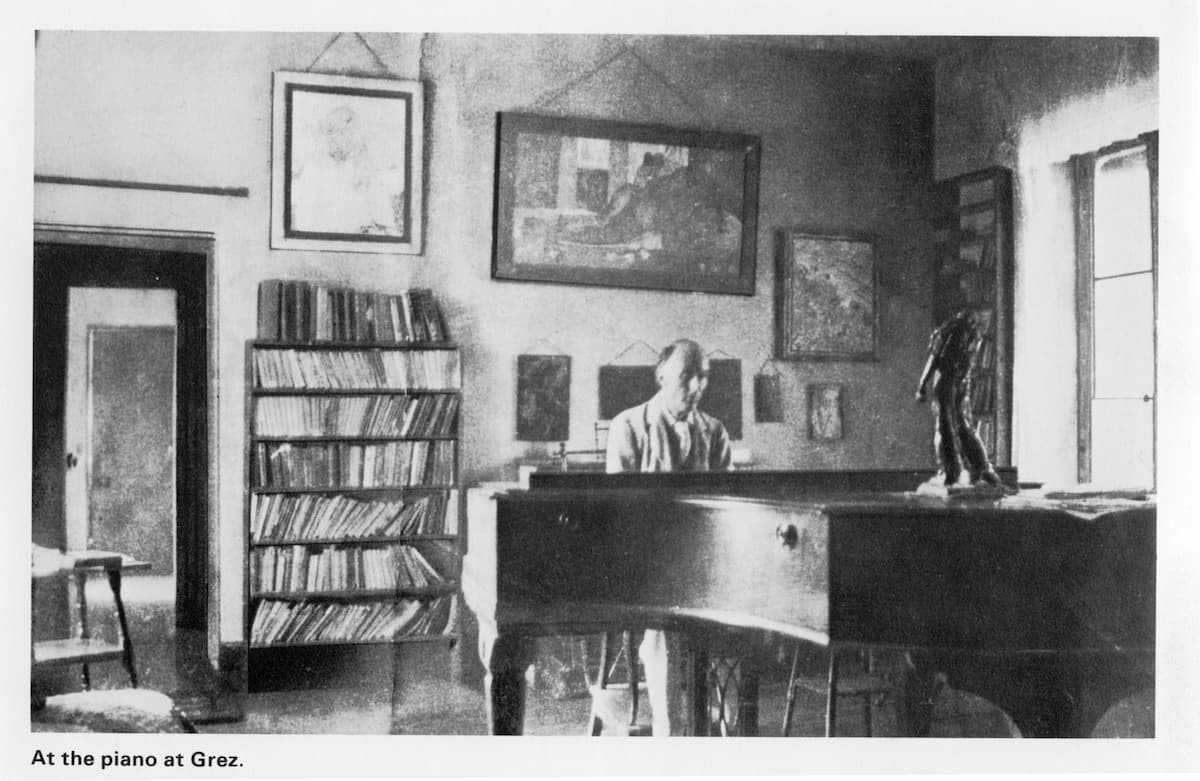
Frederick Delius at the piano at Grez
Fenby described Delius as a rare spirit, “Nothing about him was more unusual than his calm but curiously disturbing presence instantly discernible on approaching him… His conversation gave no clue to a life committed to composition, and he spoke his mind regardless of censure… He was a perfectionist too and loathed mediocrity. He abhorred the entire system of musical training, and had little faith in men collectively unless they were playing in orchestras.” And Fenby continued, “Delius seemed to embody a fearless attitude to life, superb independence, solitariness, stoicism in suffering, a proud, stern, untamable spirit, his hardness, so unfathomable. These qualities were tempered by a certain charm, a dry wit, a boyish weakness for detective stories, a fastidious delight in the pleasures of the table, and a dandyish love of good clothes.” During a period of almost six years, Fenby helped Delius to write A Song of Summer, Fantastic Dance, Irmelin Prelude, Caprice and Elegy (cello and chamber orchestra), Violin Sonata No. 3 (violin and piano), Songs of Farewell (double choir and orchestra), and Idyll (soprano, baritone and orchestra).
Frederick Delius: Songs of Farewell (Waynflete Singers; Southern Voices; Bournemouth Symphony Chorus; Bournemouth Symphony Orchestra; Richard Hickox, cond.)
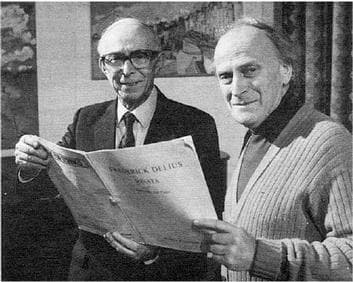
Eric Fenby (left) and Yehudi Menuhin (who shared a birthday, 22 April) study a Delius score
Every day at lunchtime, Eric Fenby waited for the signal to go to work. Delius’ armchair was positioned beside the piano, and the male nurse “would heave him over his shoulder and carry him into the chair. Then we were left alone to work.”
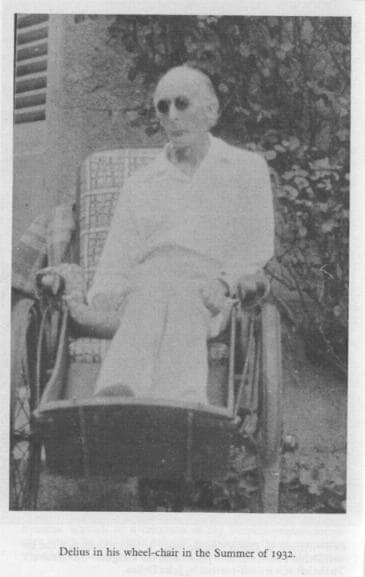
Frederick Delius on his wheelchair, 1932
Apparently, Fenby started playing what already existed and waited for Delius to respond. As Fenby reports, “By now he had changed from the paralyzed figure propped up beside me to an upright, excitable, gesticulating fighter as he felt himself deeper and deeper into the music with more and more frenzied intensity, calling out the notes, their values in time, the pitch, the phrase-lengths whilst I struggled at the keyboard to reproduce them and jot them down in manuscript. He always dictated with great rapidity and was peeved if this meaning was not grasped immediately. Verbal and musical repetition incensed him equally at this stage of his life.” There were always complications in understanding the complexity of thinking in so many strands all at once; the problems of orchestral and vocal balance; and the wider areas of possible misunderstandings in the transposing instrument.
Frederick Delius: A Song of Summer (London Symphony Orchestra; John Barbirolli, cond.)
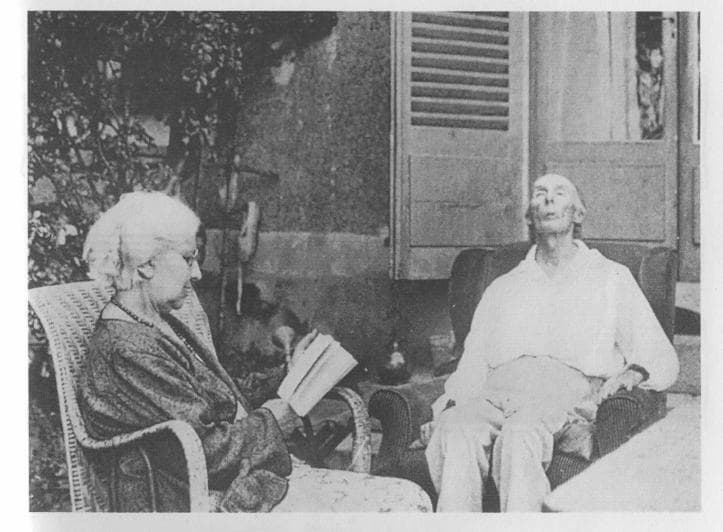
Jelka and Frederick Delius
The composer’s condition continued to worsen, and Eric Fenby returned to Yorkshire in July 1933. In addition, Frederick’s wife Jelka had been diagnosed with cancer in early 1934, and “by a lamentable stroke of fate her medical troubles coincided with an alarming deterioration in her husband’s condition.” Frederick grew daily weaker and died on 10 June 1934. As Jelka writes to a friend, “He died in his sleep, surrounded by us all and without feeling the end just as he would have wished… He looked so natural, beautiful, and calm after all this pain, unrest, and sleeplessness that one could only feel thankful… It was of course the most dreadful tragedy that Fred’s progressing illness coincided with my operation for a large tumor. Our doctor brought me home, and I owe it to him that I had a few days with Fred and to have seen his happiness about it.”
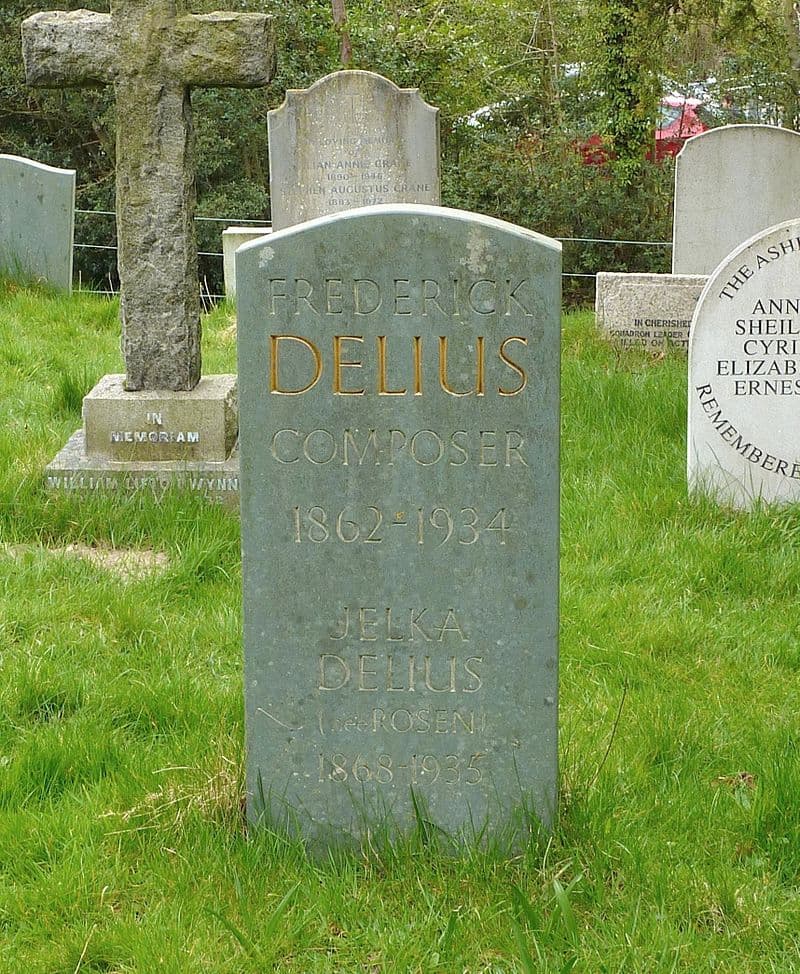
Grave of Frederick Delius
Delius was temporarily buried in the village churchyard pending his final removal to England. As expected, his transfer turned into a bureaucratic nightmare taking the better part of twelve months. In the end, Delius was taken to Limpsfield near Oxted in Surrey. The London Philharmonic Orchestra played a few of Delius’ short pieces, and Vaughan-Williams also paid his respects. Merely four days after the re-internment, Jelka passed away and was at once buried by her husband’s side.
For more of the best in classical music, sign up for our E-Newsletter

Eric Fenby deserved a knighthood for what he did